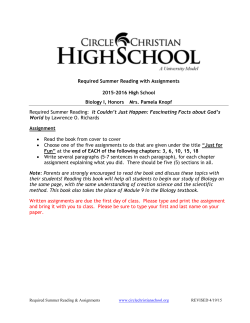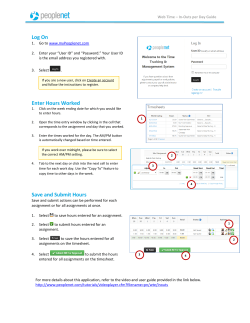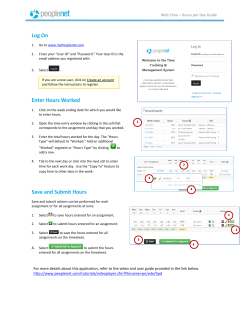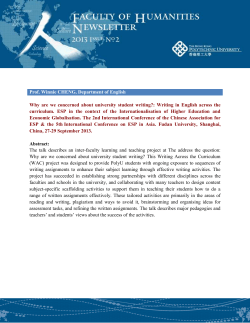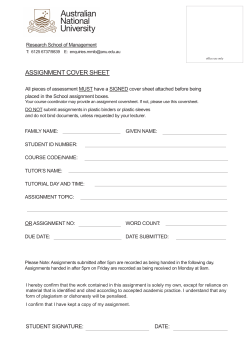
MasteringChemistry with Knewton Adaptive
MasteringChemistry with Knewton Adaptive Follow-Up School Name Hudson Valley Community College, Troy, NY Course Name General Chemistry I t Course Format Lecture and lab Key Results The introduction of new concepts prior to lecture increased student engagement and participation, and the addition of prelecture and Knewton Adaptive Follow-Up assignments resulted in higher exam averages. Submitted by Donna Barron, Assistant Professor Course materials Introductory Chemistry (custom), Tro About the Course Hudson Valley Community College serves approximately 13,000 students each semester. Eight out of 10 students come from the immediate, capital region, and approximately 50 percent are enrolled part-time. General Chemistry I is taken primarily by science, health, and engineering majors planning to transfer to a four-year institution. The course covers atomic structure, chemical bonds, reactions and equations, properties of gases and liquids, and changes in state, solutions, and stoichiometry. Challenges and Goals According to Assistant Professor Donna Barron, students often do not understand the learning process and tend to employ the same type of passive learning they did in high school versus taking responsibility for learning and practicing problem solving outside of class. When students don’t take responsibility for learning concepts on their own, it impacts the type of activities that can be done during class time. Barron also observes that students tend to stop listening when they hear new words or terms they don’t recognize. For students who haven’t prepared, that can be much of the content covered in class. “If a student’s attention is lost, they’ll miss out on information they need to succeed in the course,” she says. She assigns MasteringChemistry homework to introduce 30 • www.masteringchemistry.com content to students prior to class and to help them become familiar with concepts on their own time. Barron hypothesizes that this helps students come to class with a better understanding of what they don’t know, and that as a result of redesigning the course to include Knewton Adaptive Follow-Up (AFU) assignments and prelecture work, student learning will increase. Implementation Barron implemented MasteringChemistry in 2009 so she could offer her students online homework with immediate feedback and grading. MasteringChemistry homework was due after the chapter lecture and tended to include activity and tutorial questions. As Barron became more knowledgeable about how to use MasteringChemistry to enhance learning, she made changes to her implementation to flip the classroom. In spring 2013, Barron added MasteringChemistry prelecture homework assignments: short, untimed assignments due before lecture designed to help increase student awareness about new topics and to identify student misconceptions and areas of misunderstanding. Barron tells students it is okay to be confused after doing the homework because the concepts will become clear during class. In spring 2014, Barron assigned both MasteringChemistry prelecture and postlecture homework, and offered optional Knewton Adaptive Follow-Up exercises for extra credit. AFU exercises are designed to help students fill in any gaps in their understanding, so each assignment is generated from a student’s performance on their MasteringChemistry parent homework. MasteringChemistry with Knewton Adaptive Follow-Up: Hudson Valley Community College 76% 80% 67% Average Final Exam Score 70% 80% Average Final Exam Score 64% 60% 50% 40% 30% 20% 10% 79% *** 70% 58% 60% 50% 40% 30% 20% 10% 0% 0% Spring 2012 postlecture HW Spring 2013 pre- and postlecture HW Attempted or tested out of ≤ 4 AFUs Spring 2014 pre- and postlecture HW, AFU Knewton Adaptive Follow-Up Performance MasteringChemistry Implementation Using MasteringChemistry in these ways has freed up class time and enabled Barron to integrate more active learning exercises, to address specific misconceptions, and to explore real-life applications. Time lecturing on theory has been reduced, and Barron no longer uses PowerPoints—class time is used for discussions, problem solving, and learning games. Assessments 37.5 percent Exams (three) 25.0 percent Lab 25.0 percent Final exam 12.5 percent MasteringChemistry 120 100% 80% ** * * 100 Average Quiz Score Students automatically received extra credit for AFU assignments if they earned at least 80 percent on MasteringChemistry postlecture parent homework. Students who earned less than 80 percent were required to complete the AFU assignment to earn extra credit. AFU assignments were available starting with Chapter 6; there were seven AFU assignments available in spring 2014. Figure 2. Average Final Exam Scores by Knewton Adaptive Follow-Up Performance, Spring 2014 (Completed ≤4, n = 17; Attempted all/Missed one, n = 7; Error Bars = Standard Error, Significance p < 0.001) Average Exam Score Figure 1. Average Final Exam Scores by Implementation, Spring 2012–14 (2012, n = 30; 2013, n = 27; 2014, n = 24; Error Bars = Standard Error) Attemped, tested out of all, or missed 1 AFU rR² == 0.9278 0.86095 80 60% 60 40% 40 20% 20 0% 0 1 0% 2 3 20% 4 40% 5 6 60% Quiz Traditional classroom MasteringChemistry 7 80% 8 Average 100% 120% Flipped classroom Points Figure 3. Correlation of MasteringChemistry Homework Points to Average Exam Score, Spring 2014 (n = 24) Results and Data To understand the impact of the changes made to the course, final exam averages from the spring semesters in 2012, 2013, and 2014 were evaluated. Figure 1 shows a significant increase in the final exam average in spring 2014. To assess whether optional Knewton Adaptive Follow-Up assignments had an impact on learning, spring 2014 student data were split into two groups: those who tested out of, attempted all, or skipped only www.masteringchemistry.com • 31 MasteringChemistry with Knewton Adaptive Follow-Up: Hudson Valley Community College “Just as the name suggests, [MasteringChemistry] helped me master chemistry. I wish I had this kind of program for every class.” —Student Conclusion Additional analysis of the spring 2014 exam results explored the correlation between MasteringChemistry homework scores and average (of three) unit exam scores. Figure 3 shows a strong correlation between MasteringChemistry points and the average unit exam score (r = 0.9278). Although not shown here, there was also a correlation between MasteringChemistry homework scores and final exam averages, with r = 0.8253. This correlation includes only students who took the final exam. Since the latest redesign, Barron reports a trend toward higher exam scores for students who do the MasteringChemistry homework and Knewton Adaptive Follow-Up sets. To further promote this trend, Barron plans to continue offering AFU extra-credit assignments, but will raise the test-out score from 80 to 95 percent to encourage topic mastery. t one AFU assignment (out of seven); and those who attempted or tested out of four or fewer AFU assignments. All students fell into one of those categories. Figure 2 shows that students who attempted all AFU assignments or skipped only one AFU assignment had significantly higher final exam averages (p = 0.0004). This analysis includes only students who completed the course by taking the final exam. MasteringChemistry was initially adopted to address student engagement and preparedness, but has since evolved from postlecture homework only to the use of both pre- and postlecture homework, plus Knewton Adaptive Follow-Up extracredit assignments to address individual student remediation needs. The Student Experience Barron reports a change in student attitude toward online homework, and student feedback indicates that many students understand the benefit of doing it. She says that students enjoy class more since the implementation of prelecture MasteringChemistry homework, and that class participation increased. Students recognize the topics being discussed, and the work in class clarifies any concepts they didn’t understand on the homework. In a spring 2014 survey, students were asked about the MasteringChemistry assignments. Comments include: • “Just as the name suggests, [MasteringChemistry] helped me master chemistry. I wish I had this kind of program for every class.” • “I could rework the problems for test review.” • “[MasteringChemistry] was a great overall tool. It allowed me to focus on what was important in each chapter. The rework for practice was an excellent way to check my understanding of topics when studying for exams.” 32 • www.masteringchemistry.com PearsonCourseConnect.com
© Copyright 2025




